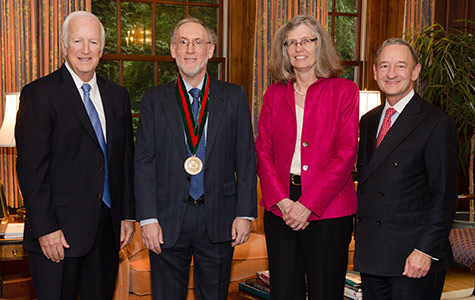
Daniel E. Goldberg, MD, PhD, a renowned researcher in molecular parasitology, has been named the inaugural David M. and Paula L. Kipnis Distinguished Professor at Washington University School of Medicine in St. Louis.
Goldberg, a professor of medicine and of molecular microbiology, was installed by Washington University Chancellor Mark S. Wrighton and Larry J. Shapiro, MD, until this month the executive vice chancellor for medical affairs and dean of the School of Medicine.
The Kipnises were longtime, devoted supporters of the School of Medicine. David Kipnis, MD, served the university for nearly 50 years, during which time his work spurred international recognition of the school’s Department of Medicine. He died in 2014, and his wife — considered an unofficial ambassador for the university — died in 2012.
“Dr. David Kipnis was such a tremendous asset to this university, particularly regarding his role in our profound growth as a research institution,” Wrighton said. “It is a privilege to have a professorship in the name of David and Paula Kipnis. The inaugural holder of this professorship, Daniel Goldberg, is a very dedicated and talented scientist and leader, just the kind of academic leader that David and Paula would be proud to hold the professorship in their names. We are fortunate to be able to recognize and support Daniel’s outstanding work in medicine.”
Goldberg earned his medical degree and a doctorate in molecular biology from Washington University and went on to hold several key roles at the university. He has been co-chief of the Division of Infectious Diseases since 2000.
“Daniel Goldberg’s dedication to research and education has greatly enriched this university and helped mold many accomplished scientists,” Shapiro said. “I know David Kipnis would have been very pleased to know that Dan was selected as the inaugural Kipnis Distinguished Professor.”
Kenneth Ludmerer, MD, the Mabel Dorn Reeder Distinguished Professor in the History of Medicine, lauded Goldberg for his accomplishments. “Dr. Goldberg is an internationally renowned physician-scientist whose pioneering studies of the organism that causes malaria have resulted in major breakthroughs in our understanding of that disease as well as the potential for new cures,” he said.
Goldberg’s work centers on the biochemistry of the parasite that causes malaria. His current research focuses on the proteins that are synthesized by the parasite, the enzymes that break down these proteins, and different genes that can be targeted in drug therapy. This research seeks to improve the efficiency of treatment and prevent initial infection.
“I am deeply honored to be chosen for the Kipnis Distinguished Professorship,” Goldberg said. “The Kipnises were great people. David Kipnis was a titan of academic medicine. More importantly, he was instrumental in setting the tone for the special culture of Washington University.”
Among Goldberg’s roles at the university, he served as director of the Medical Scientist Training Program from 1997-2007 and was co-director of the Physician Scientist Training Program from 2010-11. For 14 years he served on the executive council of the Division of Biology and Biomedical Sciences, which steers graduate education.
Goldberg is a fellow of the American Association for Advancement of Science, the American Society of Clinical Investigation, and the American Association of Physicians. He is a recipient of the School of Medicine’s 2nd Century Award and Distinguished Educator Award, as well as The American Society for Biochemistry and Molecular Biology’s prestigious C.C. and Alice Wang Award in Molecular Parasitology. He also was a Howard Hughes Medical Institute Investigator for 20 years.
In addition to giving more than 100 invited lectures around the world, Goldberg has held editorial roles with several major scientific publications and is a member of various advisory boards, including the Board of Scientific Counselors at the National Institute of Allergy and Infectious Diseases, the Burroughs Wellcome Pathogenesis of Infectious Diseases Program, the Geneva-based Medicines for Malaria Venture, and the Johns Hopkins Malaria Research Institute.
Goldberg earned a bachelor’s degree from Harvard University before receiving his medical degree and doctorate at Washington University. He completed his residency at Brigham and Women’s Hospital in Boston, a fellowship in infectious disease at Washington University , and a postdoctoral fellowship at Rockefeller University. He then returned to Washington University, where he was named professor in 1998.
About the Kipnises
David Kipnis spent nearly five decades at the School of Medicine. He first came to Washington University in 1955 as an American College of Physicians research fellow under Nobel laureates Carl and Gerty Cori.
Over the course of 27 years (beginning in 1960) as director of the university’s Clinical Research Center, he was essential to the development of a research center focused on diabetes and endocrinology. He became a full professor of medicine in 1965 and in 1973 was named the Adolphus Busch Professor and head of the Department of Medicine, a position he held until 1992.
Kipnis established firm connections between basic science research and clinical practice within the school. This connection led to the development of several generations of exceptional physician-researchers found in all levels of medical school leadership throughout the country.
Kipnis, who retired as a distinguished professor emeritus in 2009, insisted that the support of his wife, Paula, was crucial to all of his efforts. She also was very involved in the St. Louis community, serving on the board of The Scholarship Foundation of St. Louis and as a docent for the St. Louis Art Museum and the Missouri Botanical Garden.